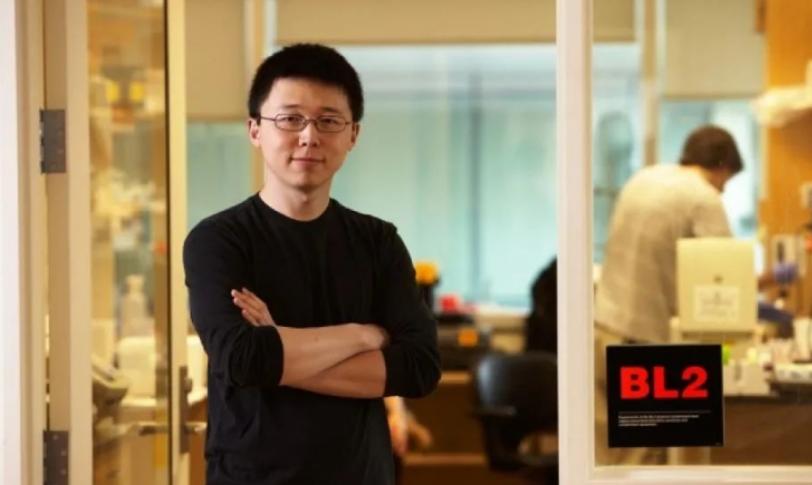Recently, a scientific lawsuit that took 10 years has finally settled in the United States. Around the ownership of the patent right of CRISPR, the most "money-like" gene technology in the field of life sciences today, Zhang Feng (40), a Chinese-American professor from the Massachusetts Institute of Technology, and two scientists who won nobel prizes for this technology have spared no effort to "go to court" several times. In the end, zhang feng, a Chinese, won the patent rights war after regretting missing the Nobel Prize.

Originally CRISPR is a natural immune system invented by bacteria in the evolution of billions of years ago, a permanent memory of the invading virus, when the virus invades again, the Cas9 protein will respond quickly, accurately jam the virus DNA and swing the "scissors" without hesitation. In the early 2000s, scientists began to realize the disruptive significance of this technology, and in the following years, a series of blockbuster results were achieved.
In August 2012, Professor Charpentier of the University of Vienna and Professor Doudna of the University of California, Berkeley, successfully analyzed the working principle of CRISPR/Cas9 gene editing; in October of the same year, MIT Professor Zhang Feng's team confirmed that the CRISPR-Cas system can be used as a tool for gene editing and has successfully edited human and mouse cells; in January 2013, George Chetch's team at Harvard Medical School published the team's CRISPR research results in Science.
In the summer of 2020, Charpentier and Doudna were jointly awarded the Nobel Prize in Chemistry for "developing a genome editing method", while Zhang Feng and Georges Chetch missed the prize. The reason for the award is even more refreshing: using these technologies, researchers can change the DNA of plants, animals and microorganisms with great accuracy, thereby giving new solutions to cancer and making the dream of curing genetic diseases a reality.
In response, Mikael Dolsten, chief scientific officer of Pfizer, said: "This is an exciting frontier of science, with the opportunity to help patients with rare genes cure diseases.
However, with the recent ruling of the USPTO, Zhang's team was the first to use CRISPR/Cas9 technology to edit animal and human cells. In this feast of the century, The Chinese Zhang Feng cannot be said to have gained a lot. In fact, Zhang Feng was not the only Chinese present at this feast, before that, the former richest Chinese, Li Ka-shing, had already "made a quick start".
According to media reports, as early as 2011, Li Ka-shing, who was extremely obsessed with "immortal dreams", established the "Li Ka-shing Biomedical and Health Science Center" in California, and also donated $40 million to the University of California, Berkeley. The principal chair professor of the center is Ms. Doudna, who won the Nobel Prize nine years later.
Perhaps smelling something different, in 2014 Li Ka-shing donated an additional $10 million to fully support The Innovative Genomics Initiative (IGI), of which Doudna is executive director.
Unlike Zhang Feng,who is obsessed with the genetic field, Li Chaoren doesn't seem to be satisfied with putting "eggs in one basket." Hong Kong media revealed that in 2018, Li Ka-shing took a different approach and invested $25 million in a factory that was not optimistic about the outside world, and the latter was committed to the landing of similar "MAX Jinchun" reverse aging technology. This technology, since 2013, has been confirmed by international top journals such as Nature, Science, and Cell, and timely supplementation can restore the youthful state of the body, which is of great significance in slowing down the aging process of muscles, bones, and body surfaces.
In fact, this technology has long been popular in the Rich Circle in the United States: Harvard University Professor David Xinkele is one of the loyal disciples, after simple intervention, the physiological age (actual age) of 51 years old dropped by nearly 19 years, and his brother of the same age was almost "sentenced to two people"; the rich Musk's birth mother, Meyer, who is in her 70s, is in good shape and looks good after trying, and seems to be no longer troubled by the aging progress...
This "youth storm" blowing from the Rich Circle in the United States is also sought after in China. Big data shows that in the past year alone, the life material similar to "MAX Jinchun" on the Beijing and cat platforms has become a hot spot for high-net-worth groups to buy for many times. Rich celebrities, including Li Ka-shing, Zijin Chen, Pan Shiyi and other rich people, are already loyal fans of such immortal substances.
In fact, behind the fierce competition for the ownership of CRISPR technology patents by Chinese Zhang Feng, the hidden "secrets" cannot be described as amazing. Because CRISPR technology is about the genes of all living organisms, including animals, plants, and microorganisms, its prospects seem to be left to the imagination of human beings. This means that the business empire, founded by CRISPR technology, is equally imaginative.
What's not known to outsiders is that the cake-cutting operation has already begun: in 2013, Zhang Feng founded Editas Medicine; in the same year, Charpentier founded CRISPRTherapeutics, and Doudna founded Intellia Therapeutics in 2014. At present, all three companies have been listed, and the business monetization ambitions of the three people are evident.
After the 2020 Nobel Prize in Chemistry was released, Li Ka-shing cried with joy. Coupled with the previous investment in similar immortal technology, it has to be said that Li Chaoren is really smooth sailing in the "immortal" track. Perhaps Silicon Valley mogul Peter Till best interprets the former's mentality: You usually have three ways to face death: either accept it, deny it, or fight it. Most people in society choose to accept or deny it, but I choose to fight it to the end.